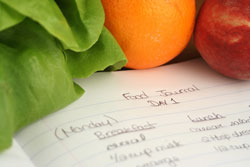Tips on Keeping a Food Diary
One of the most powerful tools in weight loss success, apart from eating correctly and adequate exercise, is keeping a
food log or nutritional journal. A nutritional journal is basically a record of what you ate every day and helps you to
asses your eating patterns, while identifying potential unhealthy patterns.
It’s both scary and amazing to see, in black and white just how much food you are consuming every day. While you
may think you’re eating too little, or not eating any “junk food”, having a record of it in your food diary will
ensure that you know exactly what you’ve eaten, which may help you get to the root of any weight problems.
 |
Keeping a record of what you ate helps you to identify any potential and
unhealthy eating patterns while at the same time keeping you motivated |
|
Keeping a record of your food intake, not only helps you identify your eating patterns now, but it may also be a very
handy tool in helping you create a nutritional program that keeps you satisfied, happy and healthy.
Here are a few helpful tips to help you start your own nutritional journal:
Write it ALL down: Whether you ate “healthy food” or not, write it down. By excluding foods you think make
you look bad, you will only be cheating yourself.
Don’t forget the little things: Things like coffee, sugar, soft drinks, juices, milk, sauces, dressings
and gravies all add up, so don’t forget to document when you ate these too.
Quantity: It is important to write down how much and which foods you ate. Now this doesn’t mean you have to go
around with a scale attached to your pocket, but remember to note the size of the portion, for instance, half a cup of
brown rice with about 200g of fillet steak and 2 tablespoons of creamy pepper sauce.
Mood monitor: It’s a good idea to record your mood and how each food made you feel. For instance, if you
were in a stressful meeting with the boss and ate a chocolate straight after, you can pinpoint that when you are
feeling stressed you eat chocolate. This may seem silly at first but it really helps you pinpoint emotional
problems.
Author: Dimi Ingle
Copyright: Remedium. This article may not be copied, in whole or in part, without the written consent of Remedium.
|